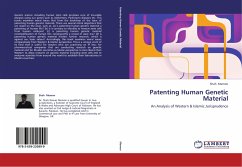Patents are widely considered to be a means for promotion and protection of innovation and this book explores the question of whether there is any room for morality in the patent law. It discusses about patenting of the inventions which are based on Human Embryonic Stem Cells (hESC) and brings forth a comparison between the patent laws of the European Union and the United States of America. The different schools of thought and approaches taken while considering the patentability of such inventions, which are controversial in nature due to the fact that they are considered immoral especially those involving human embryos, have been discussed at length. The aim of this book is to analyse the need for the 'morality and ordre public' exclusion, provided in the patent laws of the European Union, in terms of the judgements passed by the Court of Justice of the European Union.








